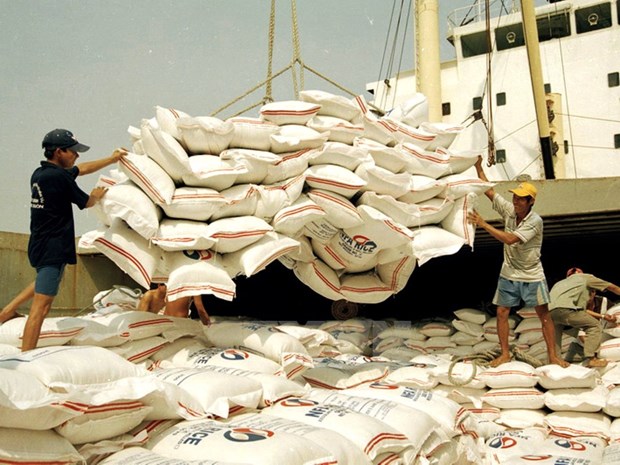 Economy
Economy


|
| Rice loaded for export. Rice traders were asked to strictly follow reserve requirements in the context of global uncertainties. - VNA/VNS Photo Đình Huệ |
HÀ NỘI – The Ministry of Industry and Trade has asked rice traders to strictly maintain a reserve equivalent to at least five per cent of their export volume in the six most recent months as well as enhancing efforts of price stabilisation in the domestic market amid ongoing global uncertainties.
The ministry’s Import-Export Department said that unpredictable developments in the global economy coupled with the declines in import demand of Việt Nam’s traditional rice markets like China, Indonesia and Malaysia were posing significant challenges to Việt Nam’s rice exports.
Rice traders must strictly comply with Decree No 107/2018/NĐ-CP about rice reserves and price stabilisation, the ministry asked.
Accordingly, rice traders must consolidate their distribution system in the domestic market and be ready to bring rice stocks into circulation to stabilise the domestic market following the authorities’ orders.
Focus must also be placed on improving facilities and enhancing awareness in production and processing to increase rice’s added value and build a brand for Vietnamese rice, the ministry asked, adding that fluctuations of paddy and rice prices must also be closely watched.
The ministry asked provincial departments of Agriculture and Rural Development to enhance cooperation with traders, co-operatives and farmers to ensure rice production to follow standards which would help Việt Nam easily expand exports.
The ministry said that China’s Ministry of Agriculture and Rural Affairs announced last week that this country could finish its goal of rice output this year. In addition, import demand from Indonesia and Malaysia was also low.
The Philippines also enhanced control over rice imports, with the revision of the food safety management system on imported rice.
Việt Nam’s rice exports in the first two months of this year reached 890,000 tonnes, worth US$410 million, up by nearly 6 per cent over the same period last year.
Seeking pork supply
The Import-Export Department also asked trade offices to work with pork export associations and companies in foreign countries to seek sources to import pork into Việt Nam.
Diversifying pork sources was important to stabilise the domestic market due to the impacts of the recent African swine flu.
The Ministry of Agriculture and Rural Development predicted that meat output would reach around 5.5 million tonnes this year, in which pork would account for 64-67 per cent.
Pig raising was recovering in recent months, the ministry said.
Prime Minister Nguyễn Xuân Phúc last week asked ministries of agriculture and rural development, industry and trade, and finance to ensure pork supply and demand balance and control prices at reasonable levels.
According to statistics from the Animal Health Department, Việt Nam imported more than 65,800 tonnes of meat as of the end of February, in which pork accounted for 21 per cent, up by 150 per cent over the same period last year. Pork was mainly imported from Canada (33.6 per cent), Germany (25.4 per cent), Brazil (16.1 per cent) and Poland (15.81 per cent). VNS




